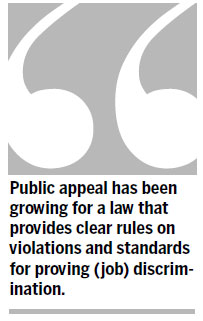Eliminating job discrimination is a tough task
Updated: 2013-05-11 08:32
By Bai Ping (China Daily)
|
||||||||

Four years ago, emulating an Australian global competition for the "Best Job in the World," a lavender farm in Guangdong province launched a national search for two gardeners for the "The Best Jobs in China".
The requirements of Tourism and Events Queensland were simple: It wanted a caretaker for a local tropical island who could speak English, swim and blog. But the Guangdong advertisers required only "beautiful" women aged 18-25 and taller than 163 centimeters to apply to work on rolling lavender fields for a weekly salary of 20,000 yuan ($3,260). Candidates were also asked to specify their vital statistics and state "which part of your body you like the most" in the online applications.
The case shows how blatant and direct discrimination can be in China's job market. To understand how prevalent it is, one just needs to take a look at a recent directive of the Ministry of Education that bans universities from hosting recruitment exercises with discriminatory terms on gender, hukou (residency permit) and academic qualifications.
This is the first time the ministry has banned job advertisements inviting applications only from graduates of elite universities on special government support programs. Such universities account for only 6 percent of the total and accommodate less than 10 percent of all college students nationwide. With a record passing out of 6.99 million graduates this summer, discrimination against those with degrees from less illustrious schools may become even worse as the number of candidates far outstrips the jobs on offer.
Despite skepticism about the effectiveness of the measure that will only be enforced on campuses, advocates of equality and justice in China hope it would be the beginning of the end of a chronic social problem that denies many people the opportunity to realize their "Chinese Dream".
Employment discrimination has deep roots in Chinese history and culture. Often poorly educated people are not aware that their basic rights are violated when employers demand discriminatory preferences for jobs. It can be too subtle for applicants to realize that a decision has been made on the basis of personal features unrelated to work.
But on many occasions, employers explicitly discriminate against jobseekers with wide-ranging criteria on age, sex, personal appearance, disease, ethnicity, birthplace, marital status and hukou. The list has been growing, with the bias for "elite" colleges being the latest addition.
Better-informed jobseekers who stand up to the mistreatment may find the costs of lawsuits prohibitively high, and the existing laws and regulations don't necessarily work in their favor.
A Chinese employment promotion law passed in 2007 prohibits differential treatment of jobseekers based on the grounds of ethnicity, gender, religious beliefs, age or physical disability. But the law is difficult to enforce, because it lacks clear standards and does not specify how to deal with violators of the law.
Earlier this year, a jobseeker in Guangdong province was awarded 601 yuan in the country's first gender discrimination case to be ruled in favor of a complainant. However, her lawyer who provided pro bono legal service said the case had to be resolved through labor authorities because the court found it hard to prove discrimination on the basis of gender and to measure the victim's loss.
Public appeal has been growing for a law that provides clear rules on violations and standards for proving job discrimination. Until that happens, the onus will largely rest on the government to promote equality and responsible employment practices. The government can work out guidelines for job ads, like the Ministry of Education's ban on discriminatory hiring activities on campuses, to let people know that discrimination is wrong and should be stopped now.
It's embarrassing to see employment discrimination pervade the lower strata of society six decades after the workers were declared the masters of the country.
The writer is editor-at-large of China Daily.

 Michelle lays roses at site along Berlin Wall
Michelle lays roses at site along Berlin Wall
 Historic space lecture in Tiangong-1 commences
Historic space lecture in Tiangong-1 commences
 'Sopranos' Star James Gandolfini dead at 51
'Sopranos' Star James Gandolfini dead at 51
 UN: Number of refugees hits 18-year high
UN: Number of refugees hits 18-year high
 Slide: Jet exercises from aircraft carrier
Slide: Jet exercises from aircraft carrier
 Talks establish fishery hotline
Talks establish fishery hotline
 Foreign buyers eye Chinese drones
Foreign buyers eye Chinese drones
 UN chief hails China's peacekeepers
UN chief hails China's peacekeepers
Most Viewed
Editor's Picks

|

|

|

|

|

|
Today's Top News
Shenzhou X astronaut gives lecture today
US told to reassess duties on Chinese paper
Chinese seek greater share of satellite market
Russia rejects Obama's nuke cut proposal
US immigration bill sees Senate breakthrough
Brazilian cities revoke fare hikes
Moody's warns on China's local govt debt
Air quality in major cities drops in May
US Weekly

|

|







